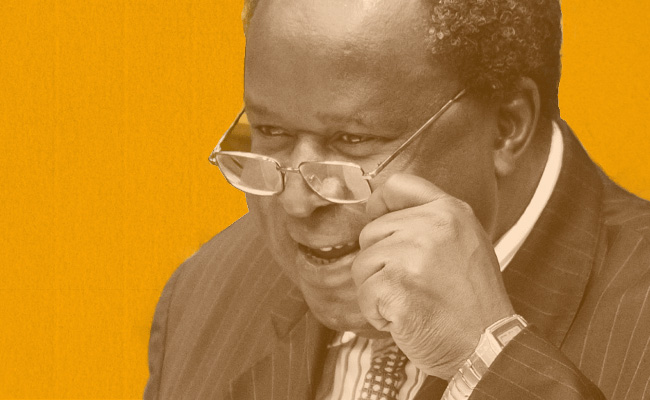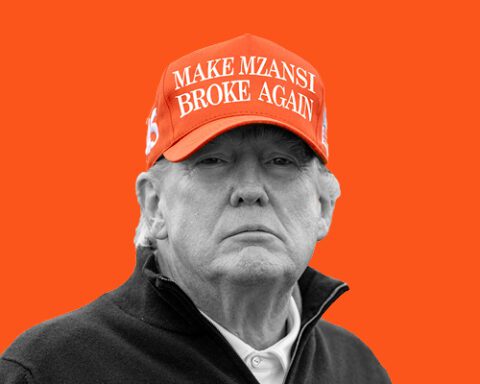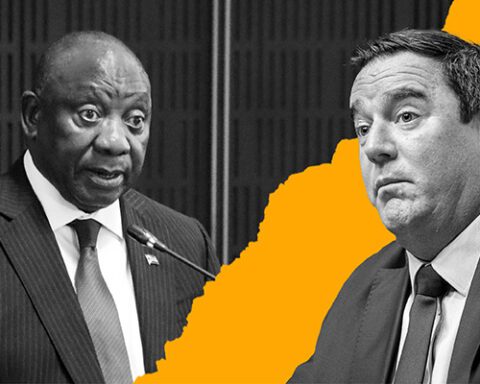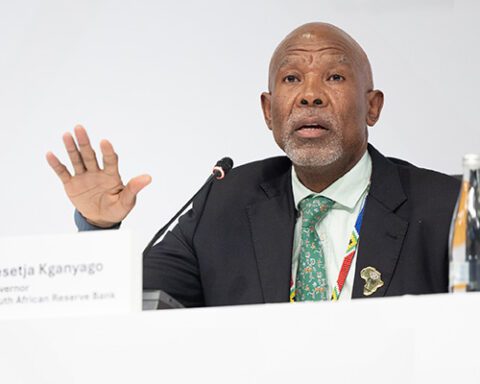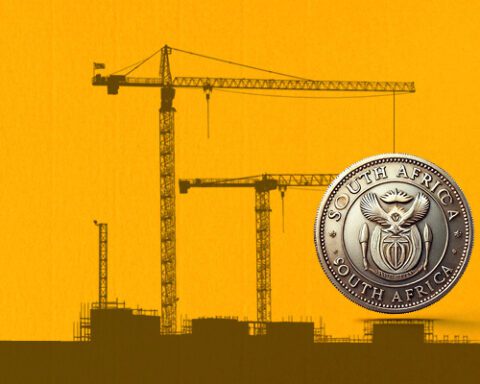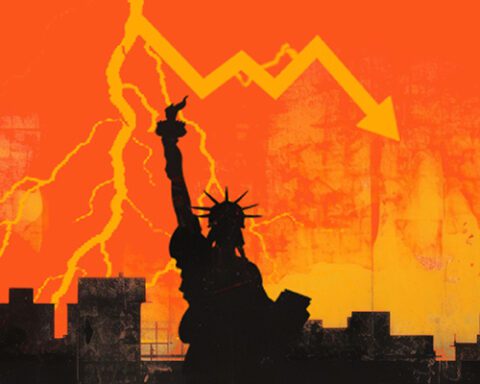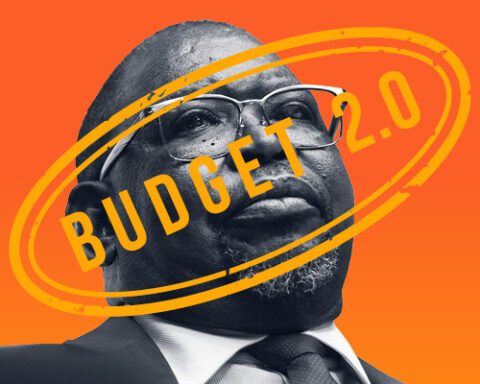In the interregnum between the release of Nelson Mandela in 1990 and the first democratic elections in 1994, a young Tito Mboweni persuaded Mandela to attend the annual meeting of the World Economic Forum (WEF) in Davos.
The ANC leader was somewhat reluctant because he knew both FW de Klerk (then president) and Mangosuthu Buthelezi would be there and he thought both were closer to the chair of the WEF, Klaus Schwab, than he was.
But Mboweni told him he could have his own programme and that it was important for him to meet some of the 1,000-odd executives there, as well as other political leaders “invited like zoo animals to be scrutinised”, as The Star newspaper reported at the time “in this exclusive club of capitalism”.
Mboweni, the former South African Reserve Bank governor and finance minister who died this week, had recently returned from exile and joined the ANC’s department of economic policy.
When Mandela and Mboweni arrived at the upmarket ski resort that hosts the annual meeting, Mboweni discovered to his annoyance that the economic section of Mandela’s speech had not only been written but had been distributed to the media. It had been penned by a small group of left-wing ANC economists based in London.
Cautious media quoted Mandela’s “prepared text”: “Nationalisation in our view does not mean a universal blanket policy of sticking rigidly to an old dogma. It means examining selected major enterprises on a case-by-case basis.”
While it may have been a compromise for the London-based economists, it sat uncomfortably with Mboweni.
Then just 32 years old, he nonetheless showed the wisdom of an elder: “It’s the wrong platform,” he told Mandela. “You can’t go in front of 1,000 business executives and talk about nationalisation. We’ve moved on. We now talk about a mixed economy.”
The incident summed up the principled pragmatism and courage that Mboweni displayed throughout his career. He tackled ideological shibboleths in the cause of rescuing and rebuilding a battered economy.
He and Saki Macozoma, a former Robben Islander and Eastern Cape activist, rewrote the speech through the night. “These people [at Davos] consider you a hero,” he told Mandela. “Don’t disappoint them.”
In the end, the economic part of the speech that Mandela delivered was quite different from the original: “We visualise a mixed economy, in which the private sector would play a central and critical role to ensure the creation of wealth and jobs. Side by side with this, there will be a public sector perhaps no different from such countries as Germany, France and Italy … in which the state plays an important role in such areas as education, health and welfare.”
Mandela, wrote Star reporter Peter Fabricius at the time, “took his softest approach to nationalisation so far, assuring industrialists that their investments would not be endangered by nationalisation”.
Mboweni told me this when he was Reserve Bank governor in 2006. There was one key incident that stuck in his mind. During the forum, Mandela met Li Peng, premier of China, a country then on the verge of an economic boom.
When their conversation turned to nationalisation, Li was puzzled. “Madiba,” Mboweni recalled him as saying, “I don’t understand why you’re talking about nationalisation. You’re not even a communist party. I am the leader of a communist party in China, and I’m talking privatisation.”
That conversation stayed with Mandela. At every ANC discussion on the economy, he would mention it. “He kept on saying: ‘Even Li Peng, general secretary of the Communist Party doesn’t believe in nationalisation. Who are we? We are not a communist party.”
A $50bn turnaround
Mboweni always had a healthy disrespect for political correctness, especially as he moved to more powerful roles in managing the economy.
When he was appointed Reserve Bank governor in 1999, he was confronted with the problem of the “net open forward book”, which added greatly to the country’s considerable debt inherited from apartheid.
“What is G?” asked Andrew Donaldson, then a young economist who joined the Treasury in the transition period, using the macro-economic term for debt.
The truth is no-one knew. The country was in much worse shape after apartheid than even its harshest critics imagined. Government consumption spending had grown from 15% of GDP in 1983 to 21% a decade later. To make matters worse, the black “homelands” – which were satellites of repression and patronage – sucked up money with scant accountability for how it was spent.
Mboweni was confronted with a nasty surprise when he arrived at the Reserve Bank: enormous negative reserves that added to the debt, “huge unfunded forward cover”. The bank, in its attempt to shore up a declining currency, had sold dollars it did not have.
“Monumental numbers that had just not been disclosed,” said Donaldson in a 2006 interview. “It was a great black hole.” These negative reserves added $25bn to the country’s debt.
Worse: the hole got deeper after the 1998 currency crisis, when the Reserve Bank tried to strengthen the rand by selling the dollar short. It did not help the currency and the overall debt mounted.
Trevor Manuel, finance minister from 1996 to 2009, and Mboweni, with Gill Marcus as his deputy, worked closely to co-ordinate fiscal and monetary policy, though Mboweni guarded the independence of the bank.
By 2001, the net open forward book, as it is known, had been reduced from negative $25bn to a negative $10bn and by 2004 it had been eliminated entirely.
“An extraordinary story,” Marcus told me a few years later. “So you had an alignment of policy between National Treasury and the central bank. Not an influence, but a question of saying, how do we complement each other?”
As Mboweni told me then: “All the forward book nonsense is gone, finished.”
He pioneered a completely new strategy at the Reserve Bank: instead of selling dollars it didn’t have, the bank bought excess dollars whenever they were available. There was no currency intervention.
“Some call it creaming off … If there’s no cream, we don’t drink,” he said.
It was indeed an “extraordinary story”. By 2006, the country had foreign exchange reserves of positive $25bn – a turnaround of $50bn in just over a decade.
When he reported this to the parliamentary finance committee that year, one of the few questions he was asked was: “Is there a woman involved in managing the reserves?”
“Bloody hell,” recalled Mboweni. “I was really irritated that day.” The question may have been politically correct but it displayed a cluelessness that irked him.
Mboweni had returned from exile, economics degree in hand, having left Turfloop university in 1980 as it became a “warzone”. He had applied to the University of Natal but was refused entry because he was black.
He returned to a country in 1990 still replete with racism. He could not find anyone to rent him an apartment in Johannesburg and ended up staying with Maria Ramos for a while. She was to become director-general of the Treasury in 1996.
Manuel was appointed head of the ANC’s economic policy department in 1991. It was the beginning of a long working relationship that, together with the late South African Revenue Service commissioner Pravin Gordhan, formed part of the “finance family” that reduced debt, increased social spending, and raised tax collection from R184bn to R558bn.
The Zaire factor
In the same year as Mboweni attended the WEF, his then ANC colleague Manuel attended a conference in Nairobi where he was given three banknotes from what was then Zaire, all bearing the face of its dictator Mobutu Sese Seko.
Issued in 1992, ostensibly to stave off a liquidity crisis, they were worth, on paper, 5-million “zaires”. They were worse than useless.
Their value plummeted to $2 within two years. And when the government paid the military with them, soldiers rioted when they discovered they could buy nothing, marking the beginning of the downfall of Sese Seko.
Manuel brought three notes home. He kept one, gave one to Thabo Mbeki, and the third to Mboweni. He did not know then that he was giving one to the future governor of the Reserve Bank.
It remained a salutary reminder to Mboweni of what can happen when inflation goes wild and debt soars.
Throughout his career, Mboweni risked political popularity to avoid precisely that scenario. It was a bargain that paid off handsomely not just for The Governor, but for the country too.
Pippa Green, is a journalist, the former Press Ombudsman, and author of ‘Choice not Fate: the life and times of Trevor Manuel’ (Penguin, 2008).
Top image: Former minister of finance Tito Mboweni. Photo by Gallo / Images by Jeffrey Abrahams.
